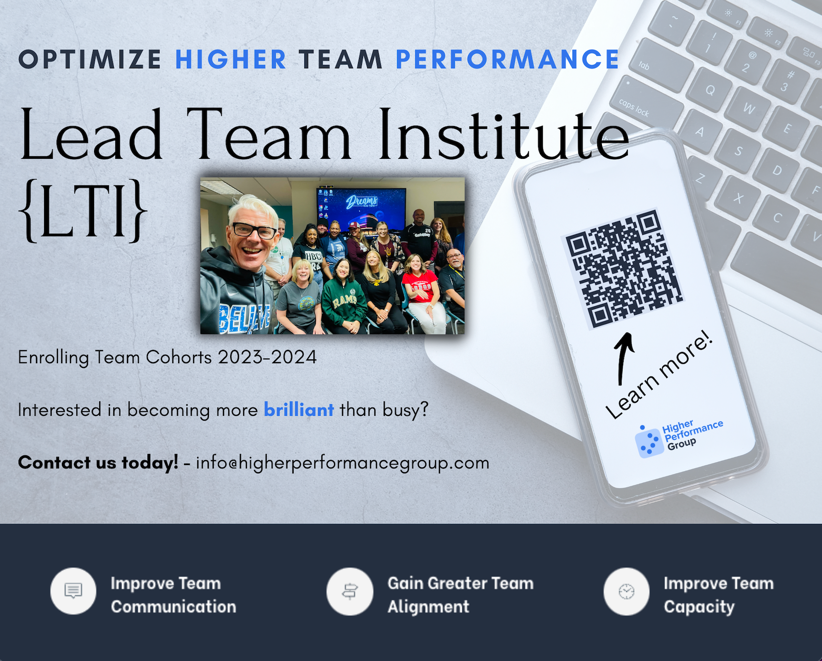The 5 Temptations Every Campus Leader Must Overcome (Or Become the Joke at the Dinner Table)
Most leaders I know (and serve) are struggling and wish for a better reality.
- “What happened to community trust?”
- “How do I get my team back to full strength?”
- “Since when did the arena of education become such a powder keg?”
The last few years have put that struggle into hyperdrive.
The current leadership landscape has twisted leaders into a bundle of tired and (at times) timid souls scrambling to find the skills and strategies they need to make progress.

There have been loads written about tactics to reclaim your momentum, but not enough people are honest to talk about the temptations that predictably show up to struggling leaders.
While ‘moral’ temptations are part of the equation, it’s more nuanced than that.
It’s easy to settle in and become hooked on maintaining the status quo when the going is easy, the numbers are decent, and nobody is breathing down your neck. Often to the point of cheating the practices and disciplines that built your winning trajectory.
It’s also easy to fall into lazy leadership in seasons of struggle. Regardless of the reason, when you’re in a slump, you’re tempted to cheat in ways you weren’t when things are going well.
Here’s what you’ll likely be tempted to do under sloth or stress that will cause your team to poke fun of you at their dinner table.
1. Moving the goalposts
Moving the goalposts signifies insecurity and is a horrible leadership strategy when uncertainty rules the day.
Great leaders and teams
Plan, Do, Study, and ACT.
Not ACTING is a common temptation for leaders and teams responsible for leading systems.
What do you do when data that used to make you smile now shows decline instead of progress?
A natural response is to shut your eyes and stop looking.
Many leaders who track progress when their organization grows become immediately tempted to stop monitoring it when the growth stops.
That’s a mistake.
Even worse, some leaders will move the goalposts toward comfort vs. courage.
- “Well, I know we used to track campus orientation visits, but that’s not important with everything else happening right now.”
- “Let’s focus on the whole student experience instead of counting _________” (fill in the blank).
Can we be honest? You never used to say that.
Ever.
And everyone around you knows it.
When you pretend that metrics no longer matter, you’re setting yourself up to become a victim of accidentalism.
Intentionality and focus are the one-two punches for Higher Performance Systems.
Compromising your expectation by lazily moving the goalposts is a terrible leadership strategy.
Practical Strategies to Reclaim Your Momentum and
Transform Team Performance
Enroll in the Lead Team Institute for the 2023-2024 academic year and Optimize Higher Team Performance.
2. Tamp Down the Vision
Another temptation leaders face when they’re struggling is to tamp down the vision.
Worse than moving the goalposts and changing how you keep score; average leaders are tempted to ignore the aims of the established vision for winning in the year ahead.
This happens in many ways, but it predominantly surfaces when campus leaders say they’re committed to EXCELLENCE but have no way of measuring what that means from the student experience.
Example: We’re about making dreams reality.
- Translation: We are currently struggling to provide programming and new partnerships due to our fixed program of study that can’t be changed in our current political climate.
Example: Community is our middle name.
- Translation: We would like to meet more of the local workforce demands, but that “W” word is not received well by the powerful voices of our faculty.
The best way to get off mission is to tamp down your vision by running for popularity over purpose.
3. Blame everyone but yourself
Poor leaders point blame. Higher Performance Leaders take responsibility.
It’s easy to blame others or forces beyond control when things are not going as hoped.
Here’s the whine list of excuses I hear from top leaders when things go south.
“Our underperformance is because of:”
➜ COVID
➜ Lockdown
➜ The Economy
➜ The Weather
➜ The Campus Down the Street
➜ Your City
➜ Your Culture
➜ The White House
➜ The Supreme Court
➜ The Faculty
➜ The Administration
➜ The Board
Anything but Themselves.
Blaming others is a clear sign of weakness (not strength) in a leader.
Deep down, most leaders know they have not lost ALL control.
Poor leaders deflect it. Great leaders own it.
4. Imagine yourself in a new system
When you’re struggling as a leader, it’s completely natural to want to escape.
You start to imagine yourself in a new job—any new job will do—and think about how much easier it might be if you did that rather than what you’re doing now.
The challenge with that thinking is that it leaks. Your people can sniff out when you start looking elsewhere.
The fact is that every new team and system has issues. Often, the grass looks greener on the other side because THEY have a remarkable marketing department and because YOU haven’t gotten close enough to see the brown blades interspersed with the green blades. Not to mention the root rot found across every human system.
Also, you bring yourself everywhere you go. This means you bring all your unresolved pain, challenges, unhealthy behaviors, and unresolved issues with you.
In many ways, leaving a job you’re unhappy with is like leaving a marriage you don’t like. You imagine a new partner will be perfect, which is completely untrue (see above). Unfortunately, you (and your new team) bring your dysfunction into whatever you decide to do next.
Granted, there are times you might be called to leave. To everything…turn…turn…turn…
No one stays in a job forever.
Here’s the Big Idea to remember. You want to quit on a good day, not a bad day. And seasons of struggle are filled with bad days.
If you’re not thinking clearly (and you’re not when you struggle), you’ll likely make a move you’ll regret later.
And because pain isolates you, you probably haven’t discussed this carefully with your wise people. You may be the only one who thinks leaving is a good idea. And if you’re the only one who thinks it’s a good idea, it’s probably not.
Curious about when it’s a good time to leave? Listen to these seven tell-tale signs:
- You’ve lost your passion.
- There are no new partnerships you could get excited about.
- You’ve impacted all the changes you can make.
- Your vision no longer lines up with the system’s vision.
- You feel indifferent toward your team and community.
- Your excitement about what’s happening elsewhere is greater than your interest in what’s happening where you are.
- Your inner circle agrees that it is time for you to fly.
5. Dulling instead of dealing with pain
When stress (and life) knock, you will answer it in a healthy way (self-care) or an unhealthy way (self-indulgence).
Usually, when I ask busy campus leaders how they’re doing, they admit they don’t take great care of themselves.
When you don’t take great care of yourself, guess what you’ll do in almost every single case?
You end up falling into sensory indulgence —you soothe the pain with the “overs.”
- Overeating
- Over drinking
- Overworking
- Over-exercising
The list is endless. Sensory indulgence involves doing anything you can to numb the pain without actually addressing the pain.
When stress and life overwhelm you, you will either respond to it in a healthy way (self-care) or an unhealthy way (self-indulgence).
But here’s the stinger:
If you don’t intentionally choose self-care as a leader, you’ll default to self-indulgence. Your team will know if the ladder is true, and so might their dinner table.
The key to getting out of the struggle begins with recognizing that you’re in it.
Understanding your temptations makes it easier to avoid making the struggle worse.
Semester II is when you start planning for Semester I
This is one of the best opportunities to begin planning to accelerate your team’s performance.
For the past decade, I have served campus Lead Teams and know your system's performance is directly connected to your team's health (and smarts).
❓How’s your team’s communication and connection?
❓How’s the quality of your system’s alignment and execution?
❓What’s your plan for optimizing your Lead Team’s capacity?
As THE people leader for your system, I invite you and your leadership team to consider enrolling in the
Lead Team Institute {LTI} for the 2023-2024 academic year.
Here is a quick link for more info.
This national initiative is designed to Optimize Higher Team Performance:
✅ Team Communication
✅ Team Connection
✅ Team Alignment
✅ Team Execution
✅ Team Capacity
✅ Reliable Systems
Our fall kickoff dates are filling up. Schedule your preferred fall kick-off date here.
Ready to reclaim your momentum and optimize Higher Team Performance?
Dr. Joe Hill - Founder, Higher Performance Group
“Because everyone deserves to live in a community served by healthy teams and highly reliable systems.”
More Blog Articles




